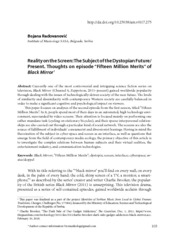| dc.creator | Radovanović, Bojana | |
| dc.date.accessioned | 2018-10-29T09:44:33Z | |
| dc.date.available | 2018-10-29T09:44:33Z | |
| dc.date.issued | 2018 | |
| dc.identifier.issn | 2217-9666 (print) | |
| dc.identifier.issn | 2406-1654 (online) | |
| dc.identifier.uri | https://fmkjournals.fmk.edu.rs/index.php/AM/article/view/275 | |
| dc.identifier.uri | https://fmkjournals.fmk.edu.rs/index.php/AM/article/view/275/pdf | |
| dc.identifier.uri | https://dais.sanu.ac.rs/123456789/4075 | |
| dc.description.abstract | Currently one of the most controversial and intriguing science fiction series on television, Black Mirror (Channel 4, Zeppotron, 2011–present) gained worldwide popularity through dealing with the issues of technologically-driven society of the near future. The levels of similarity and dissimilarity with contemporary Western society are carefully balanced in order to make a significant cognitive and psychological impact on viewers.
This paper focuses on analyses of the second episode from the first season, titled “Fifteen Million Merits”. In it, people spend most of their days in an automated, high technology environment, surrounded by video screens. Their attention is focused mainly on performing one rather mundane task (cycling on stationary bicycles), and their sparse interpersonal relationships are also carried out through a particular kind of social network. The screens are also the source of fulfillment of individuals’ consumerist and diversionist leanings. Having in mind the theorization of the subject in cyber-space and screen as an interface, as well as questions that emerge from the field of contemporary media ecology, the primary objective of this article is to investigate the complex relations between human subjects and their virtual realities, the entertainment industry, and communication technologies. | en |
| dc.language.iso | en | sr |
| dc.publisher | Belgrade : Faculty of Media and Communications, Singidunum University | sr |
| dc.relation | info:eu-repo/grantAgreement/MESTD/Basic Research (BR or ON)/177004/RS// | sr |
| dc.rights | openAccess | sr |
| dc.rights.uri | https://creativecommons.org/licenses/by-nc-nd/4.0/ | |
| dc.source | AM Journal of Art and Media Studies | sr |
| dc.subject | “Fifteen Million Merits” | sr |
| dc.subject | Black Mirror | sr |
| dc.subject | Dystopia | sr |
| dc.subject | avatar/doppel | sr |
| dc.subject | screen | sr |
| dc.subject | interface | sr |
| dc.subject | cyberspace | sr |
| dc.title | Reality on the Screen: The Subject of the Dystopian Future/ Present. Thoughts on episode “Fifteen Million Merits” of Black Mirror | en |
| dc.type | article | sr |
| dc.rights.license | BY-NC-ND | sr |
| dcterms.abstract | Радовановић, Бојана; | |
| dc.rights.holder | 2018 AM Journal of Art and Media Studies | sr |
| dc.citation.spage | 103 | |
| dc.citation.epage | 112 | |
| dc.citation.issue | 17 | |
| dc.description.other | This paper was finalized as a part of the project Identities of Serbian Music from Local to Global Frames:Traditions, Changes, Challenges (No. 177004), financed by the Ministry of Education, Science and TechnologicalDevelopment of the Republic of Serbia. | en |
| dc.type.version | publishedVersion | sr |
| dc.identifier.fulltext | https://dais.sanu.ac.rs/bitstream/id/12737/bitstream_12737.pdf | |
| dc.identifier.rcub | https://hdl.handle.net/21.15107/rcub_dais_4075 | |

